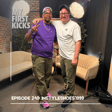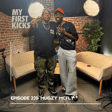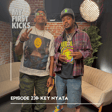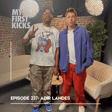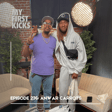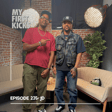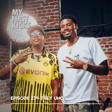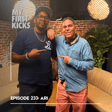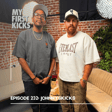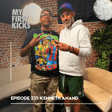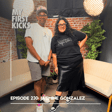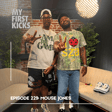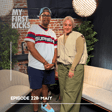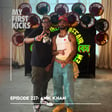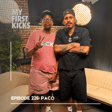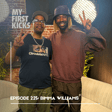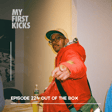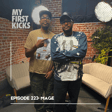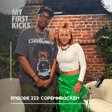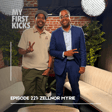Become a Creator today!Start creating today - Share your story with the world!
Start for free
00:00:00
00:00:01

A Guide to Having Nice Kicks with Matt Halfhill
This week Matt Halfhill hops on the pod to talk about his love for kicks. Growing up with professors has parents, his original major. Where his curiosity gene comes from. Explaining how Nice Kicks started, how his impact has reached people in other countries. His weight loss journey and the intense workouts he's done and currently doing. Sneaker media and the current state of journalism in writing form. Plus much much more!
Where to Find Matt:
Socials: @MattHalfhill
Website: https://nicekicks.com/
Podcast Linktree: https://linktr.ee/myfirstkicks
Music by Gordon Bombay: https://thegordonbombay.bandcamp.com/... something and tell him we sent ya!)
Recommended
Transcript
Introduction and Episode Reflection
00:00:00
Speaker
What's good everyone welcome back to my first kicks this is episode 171 and this week I welcome Matt Hatfield to the podcast and man What an episode so I'm very excited to jump into it But first let's talk about
00:00:18
Speaker
this crazy episode that I dropped last week.
The Birth of 'My First Kicks'
00:00:21
Speaker
It was such an honor having Bima on getting able to just hit him with questions that I feel like not many people have asked him. So I hope you guys check out his stuff. And if you have it yet, I hope you check out his episode. If this is your first time listening to this podcast, we are 171 episodes deep in this journey called My First Kicks and.
00:00:47
Speaker
I'm very excited to have you all on, especially if this is your first time checking it out. So if you aren't familiar, definitely wanted to talk about how this podcast started and where nice kicks actually influenced me. And it definitely starts with just my over obsession with sneakers as they were coming out. So I get to talk to Matt about that on this episode and
00:01:16
Speaker
learn about where his obsession for sneakers comes from. So super insightful, super cool. And if you haven't checked out any of the previous episodes and are wondering my first kicks, my, my first kick story, you're going to have to check out previous episodes, but enough bantering because it's interesting to hear when people don't like it.
00:01:45
Speaker
Like I've heard and maybe you'll hear in next week's episode, but on to where you can find Matt, you can find him at nice kicks.com. Also, you can find him at Matt Halfhill, which is M A T T H A L F H I L L. And he's on everything. Super accessible. Hit him up. I had to leave a comment on that.
00:02:15
Speaker
You listened to this episode and you loved it. Well, hopefully you love it. And you know where to find your boy. I am who is hot on all social medias. Follow the podcast at My First Kicks Pod. Follow the podcast at My First Kicks on TikTok and My First Kicks on YouTube. If you have a My First Kicks story, hit me up, myfirstkickspodatgmail.com.
Content Creation Challenges
00:02:38
Speaker
I'm going to keep this one short because I want to just jump into this one.
00:02:42
Speaker
I am still working on trying to figure out the lane of content I want to put out there that accompanies this podcast. It's just a tough, tough road as, you know, I want to be speaking from a point of where I don't compromise myself, I want to say, or not compromise myself or compromise the podcast more.
00:03:10
Speaker
because I do want this to be a place where people jump on and tell their stories. And I I talk them through it and have conversations through sneakers with
The Origin and Impact of 'Bread' in Sneaker Culture
00:03:22
Speaker
this. But at the same time, when I want to make content, I do want to make skits. I do want to make short essays and visuals and something that will pique my interests beyond this podcast. So be on the lookout for some of that.
00:03:40
Speaker
as I try to reshape my social medias. But yeah, on to this week's episode with Matt Halfill. Hey, Matt, welcome to the podcast. Hey, how's it going? Good, good. You know, this is a long time coming. I feel like I reached out to you when I was like on episode 10. I could look at my message. I'm not going to do it, but I reached out to you a long time ago. It's a pleasure. Thank you for having me on. No. Yeah. Like I said, you know,
00:04:08
Speaker
It's a huge honor to have you on, because I've been a frequent visitor of nice kicks and everything that we've messaged back and forth recently with the bread fours, that whole thing. We definitely talked about it. I think they're called the black cement fours, actually. Yes. I love the back and forth with it. I mean, my explanation, and I talked about it on that episode with JSM and AD sneaks,
00:04:38
Speaker
I've messaged you back, but I realized I messaged you back way too late. You were probably moved on after that. But my explanation behind it is that this is what we in the city, in the city of New York, we gave it that like bread for because it was like black and red. And I think from there, like it just spread like wildfire.
00:05:03
Speaker
when do you remember it in new york city being called the bread fort i want to say two thousand and
00:05:09
Speaker
See, I graduated, I'm about to make myself sound so old right now, but I graduated high school in 2008. So I had to have heard it around 2006, because I stopped cutting school in junior year. Interesting. Yeah, so I mean, the first time I had heard it referred to as a bread four was I think in the 2000,
00:05:37
Speaker
eight or nine area. I think probably from the CBP is where, but even then I think that there was a release shortly after. That was the first time I remember people calling it the bread floor. I actually traced it back. Believe it or not, I really actually nerd out over who was the first to publish something by a certain name. So I went down the rabbit hole and found
00:06:02
Speaker
This de-grade blog called Kicks on Fire, that was an intentional shot, was the first to call it to the bread fours. Everything before was black cement. I mean, you went on to ISS forums, Nike talk, black cement. That was the first time I ever heard bread four.
00:06:18
Speaker
Or I'd seen that you represented the red board. The origin of bread is also a funny story too. That one dates back to the 2003, or I first saw it in 2003, the black varsity red Jordan 12s. And someone had written or leaked the colors for upcoming Jordan 12 retros and somebody put B dot slash
00:06:44
Speaker
V red or B dot slash and then capital red. So, so B dot and like people were trying to decipher what is this? Yeah. And people were like, Oh my God, this is shoes. He wore in the flu game or whatever. But
Matt Halfhill's Sneaker Journey Begins
00:06:57
Speaker
I really think that, you know, when people saw the capital B a slash and then a capital R, people just put it all together and started calling it bread. And like, that's where I saw it for the first time ever written. Yes. On Nike talk 2003 attached to the Jordan 12s. That's so interesting because I definitely want to say I remember because the reason why I say I know it's high school that I learned it.
00:07:22
Speaker
is because there was that moment because I'm not afraid to ask. I will make myself a fool. I will be like just so I can learn the answer. And I was like, what the hell does bread mean? And I literally said that. And I remember being in junior, being a junior or was it sophomore, sophomore in high school and being because like I was not a big, big sneaker here, but I was like, I was like, OK, this is like I wish I had the money for this. Let me just at least study up on this as much as I can. And
00:07:51
Speaker
All the kids in my school were always just wearing Jordans and then they were just tossing the...
00:07:56
Speaker
the phrases around, like, you know, UNC bread. And I was just like, what's bread? And then they were like, black and red. And I was just like, ah, that makes sense. And then from then, it just kept going. Like, yeah, that's how that's my knowledge of it. To me, it was nails on chalkboard for me, because I was always just like black cement. And then and then really was with the Jordan 11, which I always called the playoffs. I knew everybody else called them playoffs. When I heard that you called the bread 11.
00:08:22
Speaker
I wanted to cry. I was like, no, don't you dare do that to the shoe. Like this has so much history to it. Don't you dare. And so, but then it's like, it's just like, it's jumped the shark. Now, now I will say, so you had bread 11. Yeah. Then when people were talking about Yeezy colorways and I started hearing people say the blinks, I'm like, this stops right now. Like we, we used to be a proper country. We used to have public education. That was worth a damn. Now you're calling things breads and blinks. Like what the F is next.
00:08:52
Speaker
Like, this is how democracy dies, okay? We have to put our foot in the sand and say, this is the line. We are not crossing this as a society. Anyways, old man rant. No, no, I love it. I love it. But for people who aren't familiar with you, how about you introduce yourself? Yeah, so my name is Matt Hatfield.
00:09:11
Speaker
I'm 39 years old. I am founder, CEO of Nice Kicks. I've been doing sneakers since I was 16 years old. My first job was working at a shoe store called Athletes
Multicultural Influences and Sneaker Culture
00:09:22
Speaker
World. Started March 30th, 2001. So just over 23 years ago and started Nice Kicks in June of 2002. Sick, man.
00:09:34
Speaker
Yeah, I mean, I get it flustered of just trying to be like, you know, you don't understand how how much I visited like maybe 10,000 10,000 clicks alone or just me. Yeah.
00:09:49
Speaker
Back when I was on the easy boards, like I don't think you've, I don't, I don't even know if you've ever spoke, like had, I don't even think anybody who's or on easy boards are still either into sneakers or if they are, they're just kept it like straight to the slide. Cause like you had to be like, I was, I was on all the easy boards for like Nike talk, ISS, uh, nsb.org. Like I was on all of that. And yeah.
00:10:14
Speaker
It's crazy. You had to put in so much extra work back then to get information in the easyboard era. Like you made a commitment to get that stuff.
00:10:24
Speaker
I mean, I call myself it's called I know the term is like indoor kid because for the kids that just played inside and had stuck on video games, stuff like that. For me, it was video games. But then on top of that, I was like on the message boards, forums and all the easy boards of just like the before everybody started moving the easy boards into actual learning how to do like PHP coding and stuff just to have a forum going. It's absolutely wild. I'm trying to I'm trying to remember this name of this one easy board.
00:10:54
Speaker
I would see like back in the day i think it's called boxed in and i think that's another one sounds it sounds familiar anyways yep but it's just like i said huge honor to have you on here. So.
00:11:07
Speaker
You're here to answer the question that I ask everybody each week. And that question is, what's your first kicks? What's that first pair of sneakers you absolutely needed to have? That first one, I call it the Kickstarter. It was the Reebok Answer One, the Navy patent color white. I was in the eighth grade at the time.
00:11:27
Speaker
I had gotten my first pair of shoes that was somewhat associated with a name right before that, like three months before, and it was the air much more uptempo or something like, not air much more, air hype uptempo. It was a $65 champ sports finish line type of shoe.
00:11:51
Speaker
But Scottie Pippen was featured in one of the ads for Tamp Sports with the shoe. Now, I don't think he ever wore it on court, but they made like a player version or whatever that was sold at retail. And I walked into school and people said like, oh my God, you got the Pippens. That was the first time I'd ever like received that. Somebody said a name of a person and my shoes.
00:12:13
Speaker
But then it's like, I saw the answer once. I love that shoe. And I'm like, oh, I really want these. And the fact they were, they were truly Iverson shoe. You know, this wasn't like quasi Pippin shoe. No, no, this was Iverson shoe. And yeah, that pair I had to have. I think I got the right ones here.
00:12:33
Speaker
But this is the—they re-retro these in 2022, right? Those ones? Yes. They recently re-retro them, yes. Yeah. I'm going to read a little bit of facts for the listeners here. The 2022 edition—this is, like I said, I'm just reading the re-issue of this. 2022 edition of the Reebok, question mid, Bluto brings back an iconic OG colorway of Iverson's.
00:12:56
Speaker
debut signature shoe, immortalized in an infamous 1997 game when a rookie AI crossed over Michael Jordan. The mid-top carries a white leather upper with a reinforced tumbled leather toe cap in a bold shade of blue. Reebok's blue vector trademark is outlined in red on the tongue and quarter panel, while the heel tab features the customary question... Did I get the wrong ones?
00:13:25
Speaker
Yeah. It's okay. It's answer one. This is the question was his first signature. This was one. Yes. Yes. So this is the answer one. It's all good. It's all good. All right. I'm gonna read this one then. I'm gonna read you.
Regional Evolution and Internet Homogenization
00:13:38
Speaker
All right. My bad. Everybody rewind back and forget that I said that. Think I think that this is the right one. Okay. The question returned and the answer five answer fours is coming back. Let's not okay. We're
00:13:52
Speaker
Do you have, okay, to this day, the Navy, Pat, and Paris. Oh, so you don't have an actual excerpt that I can read, so I'm gonna have to find that. Yeah, this is, yeah, this one, and actually, I'm noticing it right now. This was a post in 2012 when I think they'd ever come back, and I just caught an error where the author said they released in 97. This colorway released in 98, so even I'm actually hopping in to make an edit right now on this old post.
00:14:20
Speaker
Oh my God. I feel very responsible for this to be accurate here. I mean, come on. Yeah. Okay. So let me see if... Okay. The... Okay. I got it. I got it. Here we go.
00:14:41
Speaker
This is Iverson's second signature shoe, correct? Yes. Okay, here we go. Alan Iverson's second signature shoe, the Answer One DMX 10, was the first basketball sneaker utilizing Reebok's moving air technology. This version is built with a blue pad and leather upper, hidden lacing, and a mesh inner booty. Iverson's name is spelled on the tongue and his iconic jewel
00:15:04
Speaker
and his iconic jewel emblem appears on the heel. A cushioned midsole and gold fleckled rubber outsole are situated underfoot for impact protection and durability. That's you out here
00:15:26
Speaker
I think the white and black pair, what's the, is it the black and white pair that got the DMX commercial? It's like, I think I feel like DMX is in a commercial, right? I honestly don't recall on the different commercials. That'd be Caleb and my team.
00:15:41
Speaker
The black white was the primarily, that was the lead colorway in 97 and that one got the most marketing push behind it. I think actually all the photos. Wait, isn't that the one with Jadakiss, right? Jadakiss is on this? Jadakiss was in the, I think that was the answer five or four. I think it was the five. Yeah. But the answer four was by far, I mean, I think of that as like, that's the Iverson.
00:16:05
Speaker
I know people love the question. They think the question is timeless and whatever. He crossed my goal. I think of the answer four as the ultimate of all ultimate tires and shoes.
00:16:18
Speaker
When I was growing up, I wish I was able to get a pair ever since. I think I feel like the price point was a little bit too high, right? Like $140 was their retail? Ooh, I see. I lived in Canada at the time. I don't remember. I think they were $125. I think we sold them at out of its role for $189, which works out to about that $125 mark based on currency.
00:16:39
Speaker
Were you also you were originally raising born and born? Sorry. Yeah, my backstory. So I was born and raised in Fresno, California. Both my parents are American. And then we lived in the Caribbean for a little bit during high school. And then I finished high school in Victoria, BC in Canada. Wow. Were you like, is there a reason why you moved around so much? I mean, my parents were professors, and they took a teaching gig down in the Caribbean. And then my dad needed heart surgery. So we need to move back to America. And
00:17:07
Speaker
Well, actually the day we were moving to the Caribbean, we had, um, we got acceptance letters to emigrate to Canada. So we're like, okay, we're not going to leave the university high and dry here. Like we got to come down. So that's cool. That's wild. How, what is it like having professors as parents?
Sneakers as Social Icebreakers
00:17:24
Speaker
Um, I mean, it's a definitely unique experience. Um, there's, I think the pluses are that like education from an early age was really like just like second nature and pushed. Um, it just, it just like was natural.
00:17:38
Speaker
The downside of being a child of two professors is looking them in the eye and telling them, I'm dropping out of school and I don't think I need this. And, you know, I'm going to do my own thing. That was not the easiest conversation to have. And for years, for years, it was subtly nudged to me, you know, you can always go back, right? You know, you can always go get your degree, right?
00:18:00
Speaker
And coincidentally, I actually dropped out the same month that Kanye's college dropout album came out. He had a line in there, which was like, they ask, have you graduated? No, I decided I was finished.
00:18:12
Speaker
is his response. And I use that line forever. He's like, no, I decided I was finished with college at that time. That's wild. Were you going to school for journalism or anything that's in this? No, not at all. No, no. I originally went to school for biochemistry and then chemistry. And then I swept over to software engineering.
00:18:34
Speaker
Um, but yeah, I mean, if I had followed my path, like what I'd want to do in high school, it was, it was going to be dumb, like law. Like that's what I was first, like really into, but no, nothing journalism at all. I didn't know anything about journalism.
00:18:49
Speaker
I really, I give a lot of praise to Joe Lacuma, who's an actual journalism graduate who, you know, from UConn, a really good school with this too. He helped teach me so many things back in the early days, just talking with him about how process is done. I mean, that's sick. That's sick. When at one point, I mean, you talked about
00:19:09
Speaker
you know, getting the Reebok, uh, I'm gonna say it wrong. The Reebok answers. I keep always saying Reebok questions, but you get, you talk about the Reebok answers. Like, did your STEM or like, did that, did you start getting like, okay, I need to figure out more about sneakers from there? Or was it just like your atmosphere around you? It was, it was a thousand percent my atmosphere.
00:19:29
Speaker
So, I went to a unique school in Fresno, California, where it was a mix of an accelerated program as well as just, you know, standard high school. And the area town that I was in was, you know, it was very different from the upbringing I had in the suburbs. And I learned quickly like sneakers were a real big deal.
00:19:52
Speaker
And I had started getting East Bay catalogs in the mail from, ever since I did like wrestling and middle school, I was on their list. And what I would do is like, I just liked looking at the shoes and I don't like, if I have interest in something, I don't just like look at it. Like I study the shit out of it. So I had to memorize the name of every single shoe and understand the cushioning systems that were in each and where the cushioning was placed. Like they used to have all those nice little diagrams.
00:20:21
Speaker
But anyways, my thing was I found that I could break the ice with almost anybody by talking about their shoes. Welcome to the podcast. Exactly. Exactly. So I learned that shoes were this amazing
00:20:39
Speaker
icebreaker. And then it was a way that I could also remember people too. So I didn't remember everybody's names, but I could make visual identification with who has what shoes. And I'm like, oh, I know which person you're talking about. But shoes really became a big deal for me when my family moved to the Caribbean and
00:21:03
Speaker
I had the last shot Jordan 14s. They were almost all black. So the school master let me like wear that shoe to school and with uniform. And like my classmates lost their minds because that was the first time they ever got to see the Jordan 14 in person. And this is like almost a year after it came out.
00:21:23
Speaker
I noticed when I walked in and all these kids my age, the Caribbean, like we're into this, I was like, oh my gosh, this sneaker thing is just not just like a little American thing. This is global. So I think like it was kind of through sneakers. I discovered more about people, you know,
00:21:40
Speaker
then anyway. So yeah, it's so crazy how, you know, sneakers just like, link up with because once you compliment somebody on their sneakers, I feel like it, it instantly opens to them being like, yo, you got to know how I got these and that turns into something else. You know, yes. So the idea of just being like, you know, these Jordan 14. So you seen him song like it that's like,
00:22:05
Speaker
And they're like, how do you think you got him? Like immediately, it's always like, everybody's brains just start sparking, you start working together, figuring out, you know, and it's, it's so sick that you're able to like, you know, branch out from that on top of that, you know, like, but I also, it's funny, because your method is similar to my method. But I always ask for people's full names. And that's how I remember people's names.
00:22:30
Speaker
So that's a good one. So good one. Because usually like the first name either has like, like the first name is usually something a little bit easier. But then because then Nate, the last name is so different, that you can just be like, Okay, your name is Matt Hatfield. And they'd be like, All right, I got it. You know, that's my little trick. The so like, getting a taste of
00:22:53
Speaker
I wanna, so the question I wanna ask, but I know it's like, the Fresno has a specific sneaker culture, right? And now that you've been studying sneaker culture for so long, I wanna know what is the differences that you've seen in your starting of seeing sneaker culture around you
00:23:22
Speaker
in Fresno versus like studying secret culture over these past years? I mean, to be honest, like in Fresno, there wasn't really much of a sneaker culture in a lot of places. I mean, there is sneakers as a there were only like two or three high schools in Fresno where people cared about sneakers. You know, a lot of times people just they wore whatever kind of thing. It's like whatever was like fashionably trendy at the time.
00:23:47
Speaker
And sneakers meant a big deal to folks at Edison for sure, at Edison high school in Fresno, California. What I've seen change in my life, it's insane. I mean, you have to remember in Fresno, we had one mall that had sneakers. We had a world footlocker. That was the big deal. And we did get adjusted for feet. That was definitely another big deal. But then other than that, it was all sporting goods or clearance channels like big five. So it wasn't a big sneaker scene there.
00:24:20
Speaker
And then also too, like in the Caribbean, the only shoes that were there were ones that people bought in the United States and then brought down. So they were either extremely expensive or they were old models of shoes. And then in Canada, I lived in a small town, so I didn't get access to all the greatest stuff ever either. What I found when I started really working in this space was
00:24:45
Speaker
As I traveled different places, I saw that each sneaker scene in each city was very different. And this was at the earlier part of my career. Now I think it's much more.
00:24:56
Speaker
pretty much the same everywhere you go. But there was a time where a shelf in New York City looked very different from a shelf in a sneaker space in LA that looked very different from a place in Atlanta. You had completely different assortments of shoes. There might've been some overlapping models here and there, but like
00:25:16
Speaker
you were going to find probably as many Bo Jacksons in an Atlanta sneaker shop as you would Air Forces up in New York, as you would Cortez's and Chuck's in LA. It
Internet's Influence on Sneaker Culture
00:25:29
Speaker
was very different, much more regional flavor to stuff. Now things are, I don't want to say monoculture, that's not the right term, but it is much more flat in terms of what the assortment and style is.
00:25:44
Speaker
The, I mean, I totally agree with you because I think now that, now that the invention of the internet or whatever, like now that culture, the culture or streetwear culture in general, just like fashion just like spreads out so fast that everybody's trying to be on trend at all times. It loses the city identity. I mean, we still have like versions of it, but
00:26:11
Speaker
It's interesting because before it was, yes, we had the internet, but still people were it like you can identify who's from where, you know, just by straight off as just style.
00:26:28
Speaker
Well, and I think what it is is it's what's the source of the of like the influence and inspiration. So like, I think earlier on, you know, 15 years ago, right? The internet covered what was happening in a lot of places and ideas were able to spread through the internet. But now I think the ideas of influence are those inspiration points are happening on the internet for way more than ever. And because of that, you know, regional stuff just doesn't have the same influence, you can kind of get a
00:26:58
Speaker
like a little taste of where the source of inspiration is. Is it from a certain type of individual? Is it from a certain type of fashion or music today?
00:27:08
Speaker
But it's funny because I think that we went from an era where we had an extremely big long tail in internet and fashion and sneakers, and we've now actually gone back to a shorter tail to kind of what we saw in the late 90s and early 2000s. And I think that part of the reason that we're seeing this phenomenon is
00:27:33
Speaker
The long tail of the web has now been shortened by algorithms because what matters so much is reach and visibility. So we're seeing some pieces of content and some individuals get a disproportionate share of voice and visibility and influence than we did in years past.
00:27:53
Speaker
Um, so I think that's why today, like you go to some high schools and it's like, wow, this feels like the click era of the nineties. There's your goths. There's your punks. There's your skaters there. You know, like you have really distinct styles. And I even think like some, some high schools I see today, I'm like, Oh my gosh. It's like every fricking male has broccoli hair, like flannel, pajama pants and Crocs.
Pursuing Passion: College Dropout to Nice Kicks
00:28:19
Speaker
I'm like,
00:28:20
Speaker
This is insane to see because it hasn't been like this in a long time where you have so many people in youth dressing very similar. Yeah, it's absolutely wild. I mean, it's funny you said broccoli hair and immediately thought about Justin Timberlake. Oh my gosh. He's the OG, right? Yeah, yeah. Immediately. He kept his curls a little tighter though. Yes.
00:28:48
Speaker
I mean, it's wild. I mean, there was that one point where a lot of kids were doing like blonde, half blonde, half black hair or something like that for a little bit. Like it was like that, that like 30, 30 blonde is what I was talking about. Listen, listen, you calm the internet, you'll find some frosted tip arrow of math. That was there. All right, so like,
00:29:11
Speaker
At what point, because we talked about a lot of your back history, at what point were you like, all right, sneakers is it? I'm going to dive full head first into it. I mean, it really, right off the bat, I just went in. The point of no turning back for me was when I did drop out of college. Okay, this is going to be my thing, at least for quite a while. Was there something that was like,
00:29:36
Speaker
Was there like a moment where it was like, all right, I need to do like, I need to jump it. I can't do half in half out. Or was it just like, nah, I'm going gun ho. Like, you know. Yeah. I mean, I mean, I knew pretty quickly into first year that. I mean, my grades were not great in first year university. And that was, that was definitely an indicator that this might not be a thing for me. And.
00:30:01
Speaker
By mid part of second year, I knew like, yeah, no. Like I could see like my heart and mind was going to the business and going to sneakers. It wasn't going towards school. So I knew like it was, I was not giving my business what it deserved by trying to be half in half out. I also wasn't giving school what it deserved, you know?
00:30:25
Speaker
It would be better for me to go back later and actually take it seriously than to try to like halfway through it.
00:30:34
Speaker
So that's when I decided. And then, well, I mean, you didn't just start nice kicks off. You were just like, no, I did. So I first started while I was still in high school. So like, I mean, I was able to straddle both. Yeah. Yeah. And then from there, it just like, it grew exponentially, I will say, because I feel like when I was early on reading it, you know, you had
00:30:58
Speaker
Kicks on Fire, you mentioned. And then it was like... They came after it, but yeah. Yeah, yeah. I'm talking about when I started reading. Oh, okay, okay. I'm talking about when you started it. And then just the expansion of just sneaker media, right? Yeah, for sure. Just that crazy boom. And after that, it's grown, as I said, exponentially. But where was your foresight to be like, you know what? This is the move. I'm going to start it up and then be like,
00:31:29
Speaker
Cause as you said, like, you know, you're part of your, you are, you're, you are part of the reason why it's expanded so fast. So yeah. Yeah. I mean, I, I, I think that I had the foresight on the format of blogs and what it was, was again, it was observing my own patterns and my own behaviors. I spent a lot of times on sneaker forms. I also spent a lot of time reading blogs.
00:31:57
Speaker
And then I was like, wait a second. What if we put these two together here? I saw that it was actually really hard to find information on sneaker forms. And it wasn't by any fault of the users, it was by purely the design of the product. And if you weren't a really, really regular user of it, it was hard to come and go and get information.
Building Nice Kicks and Online Community
00:32:22
Speaker
It was also really hard to know unless you were a very, very
00:32:26
Speaker
regular user who was giving information that was credible and who wasn't. You couldn't just go, oh, how many posts does this person have? Does that give you credibility? Not necessarily. Are they a certain form? Does that make them credible? No, not necessarily. I was reading a lot of blogs like TechCrunch was one. I'm trying to think of some of the other ones that I was wired. There were quite a few.
00:32:56
Speaker
tech blogs that I read and I was like, okay, this should be it for sneakers. We should have that. In 2005, Hypebeast and High Snobiety, which was on a blog spot at that time, were up and they were a combination of sneakers and streetwear. Coincidentally, I actually lived only a mile or so from Kevin Ma at Hypebeast while I was running his site.
00:33:18
Speaker
But I thought like, okay, these sites are good, but I'm not so into the streetwear. I'm not all that, like, I think vinyl toys are cool. I'm not going to be writing about these things. And like the street art, like, yeah, I really liked it, but I just felt like there was a need for people who were like myself who really cared about not just sneakers, but the stories behind them. And that's what made me think, okay, no, make a blog purely about sneakers and upcoming shoes.
00:33:46
Speaker
What, like, when, as you were starting, what was the current, what was the reception and then like, how did it feel once you've noticed that there was a community building being built behind this as well?
00:34:01
Speaker
Well, I kind of, I knew there was a community already because I'd spent all the time on the forums. So I knew how big secret culture was. I mean, like, just like a nice kicks community. Oh yeah. So I built a nice kicks community like 2000, late six, early seven on Drupal. But before that, it was just using WordPress. But my approach to community was I had two things. First was my space. Second thing was comment section. Now the other players in the space were not doing comment sections.
00:34:31
Speaker
I don't think high snob had him. I know hypebeast and he was on movable type. And I built on WordPress and I wanted a comment section. So I thought like it was really important for people to converse back and forth and share their thoughts on products. And this was before comment sections even had threading. So again, it took work to use a comment section to ask questions back and forth between people.
00:35:01
Speaker
But yeah, that was, I think that was kind of, that led a lot to the growth in the beginning was the, you know, the comments, and then also to our early SEO work, making sure we ranked for what people were looking for. No, yeah. I mean, the comment section was legendary. You'd had random people pulling up and commenting and be like, yo, DJ Clark Kent responded to me. Like, you'd be like, whoa, yeah.
00:35:29
Speaker
It was it was crazy what time it was wild and we actually there were times like we kind of had to kickstart I think in the first couple posts or whatever there were some organic comments, but we actually I like I like did some ghost writing of comments to create some dialogue like I cuz I knew that there was like this
00:35:48
Speaker
there was this cold start problem with comments. If you didn't see a comment in there, it was much less likely you would be the first one to comment. Though I often like if it was a topic of a shoe that I was like, I don't know how people are going to feel. I would ghost right like four to five comments of different perspectives just to make people feel more comfortable that they could jump in there and feel free to speak their mind about the shoes. It's like it's like a it's like a kid's dance. Somebody's got to. Somebody's got to dance.
00:36:18
Speaker
Or if you're a good promoter, you have a crew of dancers who go to your parties, because then everybody talks about how that promoter's parties are the best. Well, yeah, because they got the party started from jump with dancers there. Yeah. I feel like you've been in legendary rooms because of Nice Kicks. Do you have any crazy stories of like, I can't believe this brought me here.
Nice Kicks' Global Impact
00:36:48
Speaker
Oh yes, quite a few. One of the craziest moments ever was when I was in China in 2018 on a tour with Anta and Clay Thompson. There were some kids at the restaurant who were talking to somebody in our group.
00:37:10
Speaker
They were asking who I was, what we were doing, all that kind of stuff. The person mentioned like, oh, he's the guy who runs nice kicks. And the kid's eyes lit up. Again, I don't speak Mandarin. So I don't know anything, but then I heard nice kicks. I'm like, oh, they're saying something about him.
00:37:29
Speaker
But like the kid like looked up and his eyes got like super big He couldn't believe it and he pulls out his phone He pulls up Instagram which by the way is banned in China and holds up his phone to show that he's following nice kicks and it was just like this really surreal thing to be literally halfway around the globe and
00:37:51
Speaker
and then meeting somebody who's just so over the moon to meet me because he follows us on Instagram. That was a very, very surreal thing.
00:38:04
Speaker
For sure. That's wild. First of all, you probably just got him arrested. He's being taken away. We haven't heard from him since. It's like, how dare you have Instagram? Yeah. But that's absolutely nuts. I never think about how far something
00:38:23
Speaker
Because like, you know, how far any this all this stuff has reached, right? Like it's the internet is a crazy place. And it's also a small place at the same time. So it's, it's so wild for you to just have an impact on this kid as well. You know, yeah, you know, you talk about that instance. But like, you know, there is there instance where, like, you're seeing
00:38:46
Speaker
the sneaker culture get portrayed like, like, like, especially overseas, like the way it's because it's such of an American based thing, right? Where have you seen sneaker culture just like make a huge impact and seeing it firsthand for you and like how shocked how shocked was it for you?
00:39:07
Speaker
Yeah. I mean, I think it is really crazy to see every once in a while we'll pull up the analytics of just like how many countries we've reached in the past 365 days. And it really is humbling that it's like every territory and country other than like North Korea or places that like can't have internet. That to me is just incredible.
00:39:31
Speaker
Yes, maybe they're using bot farms in some of these countries too. I don't know. That to me is hard to put into words to see that. I think also too, we just saw a stat where it was the number of people we reached in the last 90 days on Instagram.
00:39:52
Speaker
We looked at the number and I was like, just how big is that? And I looked at the populations of different countries in the world and I'm like, oh my gosh, this would be the 17th largest country in the world, right behind Italy, of people who have engaged with Nicekix content just on Instagram in the last three months. It's wild. And that's the thing, sometimes it's so easy
00:40:19
Speaker
when you're working in tech and working in web to like lose perspective of just how what these numbers actually represent. These are humans. These are people and their time spending with your brand.
00:40:34
Speaker
Yeah, it's it's it's really humbling to see that. No. Yeah, that I mean, that's sick. I mean, sometimes I see I'm like, who is listening in Australia? Like, why? Shout out to you. I've wanted to ask you, like, as I thought about this, the the idea of just starting like content in general, right?
Sneaker Journalism and Storytelling
00:40:58
Speaker
The the idea of writing, I feel like
00:41:01
Speaker
It's kind of gone lost, right? And in terms of just not many people are doing it, they're more just regurgitating instead of being like, hey, this is what I think about something. And these are the facts that are laid out for us. But over these years, and you've seen the either, I don't know if you want to say the degradation of writing or journalism, but like,
00:41:30
Speaker
What have you seen that gives you hope in terms of just like sneaker content in the right, the form of writing and journalism? Yeah, I think it's a really good question because I think this actually reaches far beyond sneakers. What is the future and significance of journalism and storytelling? I think that writing matters. And I think that sometimes we make the mistake of thinking writing is only presented in text form.
00:42:00
Speaker
I think they're like the best shows we see, the best movies, the best podcasts all have an insane level of writing that goes into them. And I think that, um, so I think like the, the art is not lost. I think it's, it's kind of reshaped into different ways.
00:42:17
Speaker
I do think that we have either approached or like we've already hit or we are getting very close to peak social in terms of how we want our consumption of our content. I myself find that I'm spending far more time getting my information from knowledgeable individuals in podcast form and written form.
00:42:45
Speaker
I don't think it's going to be a far off thing that we're going to want to put our phones down and consume even more content in written format. The trend line can only go up so far.
00:43:01
Speaker
A lot of VCs in Silicon Valley would think that while screen time might be at eight hours a day, maybe we can get all these kids to spend 36 hours a day on social media. But guess what? That's not possible. So I really think we have already hit what is likely to be the peak, especially as there's much more conversation coming out about the harmful effects of spending too much time on
00:43:25
Speaker
blind and on social media. You're not going to quash people's level of curiosity. That's not going to happen. So that level of interest and curiosity is probably going to go away from doom scrolling over to other places. My long-term prediction is it'll go into some written forms. Interesting. Interesting.
00:43:49
Speaker
I mean, you just made me think about the idea because I'm always a person who just thinks more, right? So like, I mean, we talk about the breads, like I will tunnel my brain, like I will literally be like, okay, let me go back, back, back and then keep going back, back, back. And so that idea I feel like it's people
00:44:08
Speaker
don't understand that like having their phone is like having a library in your hand, but it's like a library that if you it's like a choose your own adventure library where you can end up going to the wrong side of the story instead of the right side of the story.
00:44:24
Speaker
Yeah. You can have some of the best pieces of art in your pocket or something that makes the National Enquirer looks like it should be in the Smithsonian. You have every end of the spectrum, both ends of the spectrum in terms of quality of content there. For sure. Speaking on my curiosity, but where does your curiosity come from?
Curiosity and Information Access
00:44:47
Speaker
Where did it stem from?
00:44:50
Speaker
I think that honestly, that's something that maybe just naturally came from my parents, just like observing them. I don't know. I've always had this thirst and this hunger to learn more about things. I was never satisfied as a kid with just what was presented to me in any book. And so like when we got the internet, I was in the eighth grade. Oh my God.
00:45:17
Speaker
I couldn't believe how awesome it was to be able to read about stuff that I couldn't find any information on at my high school or my middle school library. I remember when we were moving to the Caribbean, we were moving to the island of Grenada.
00:45:35
Speaker
an encyclopedia that had a little write-up about Grenada. And we had one or two copies of National Geographic that talked about the Grenada invasion in my high school library. And that was it. So I went on the internet trying to read absolutely everything I possibly could, which at that time there wasn't a lot, but it was so much more immense than what I could get locally. I think that's, if I look back at it, that was really a big tipping point for me in terms of like,
00:46:03
Speaker
this appetite I have for learning can be satiated by the internet much better than it can just like whatever is available to me locally. No, yeah, it's it's interesting because I've been trying to trying to been getting trying to get into that lane of like video essays. I mean, we talk about different types of ways of writing and I'm I'm trying to get into video essays in terms of just like sneakers and streetwear stuff that interests me.
00:46:29
Speaker
And it's like the research that you have to do, but it's also just like, am I conveying this correctly? Am I putting in the effort that I want to do? And like, have I unraveled the threads enough that it actually satiates me,
Investigative Work on Zade Kicks
00:46:48
Speaker
right? And I don't know if that's the same writing style for you when you write your articles. Because I mean, I remember, I think,
00:46:56
Speaker
I know it was either, when I first reached out to you, it was either the Zade Kicks or writing about Zade Kicks. But I know after reading about how you're reading your stuff for years, I know that you do immense amount of research. So what are your methods and how do you figure out your ways to like, all right, I've unraveled this enough. Yeah. I mean, the Zade definitely is one of my favorite projects I've ever worked on.
00:47:27
Speaker
I really appreciate my soon to be wife for putting up with me during those weeks where I was working insane hours, reading, researching, on the phone, doing everything, even going to Oregon to get on the ground to forget information about this case. That was the first time I really felt like I was just all in on a story. Let me just say, I picture you with the hat, with the press hat.
00:47:55
Speaker
They're like, can I get a word with you, sir, sir? I mean, it was yeah, it was it was something else. That whole that whole project. And I still I still I'm still working on it.
00:48:10
Speaker
I mean, that story is not done. I'm still working on it. I haven't published anything else, but Dottie Kicks was just the start. This touches so many more stories that we have seen that people don't realize there's a connection to. I can't wait to get that out there. You should pile it all together.
00:48:31
Speaker
And you should put out a book is what that's what you should do. I do think I will. I mean, like, I probably will in the end. And honestly, like I, speaking of book, like that was something I'd been wanting to do a book for choose for a very, very long time. The thing that I guess that I.
00:48:50
Speaker
Stumbled into with the book projects like I was I found that a lot of the stuff I was just basically regurgitating marketing speaking from a lot of the brands where it's like I felt like this was the first story story that you really Got something deeper than than she's with. Yeah, I mean it's interesting. I have this whole take on
00:49:09
Speaker
resellers and I think these resell shops that were popping up all around the cities and stuff like that, I think they're just fronts. I have my little red line theories and stuff like that. I can confirm that your theory is dead on. All you had to do is watch one or two seasons of Ozark and it'll open your eyes to a lot of the stuff that was going on.
00:49:36
Speaker
I mean, it's, it's so, it's wild. I don't know. 2020 like made, like either, it either opened up a ton of people's eyes on some stuff or just be like, I'm gonna just get what I want and it's going to be easier for me. But you're like, but I don't know. Like if this, like you're just like, I would, I was contemplating way too much or thinking about this stuff way too much. I don't know if it's just like being inside the house for too much, but, but the idea of just, it just came out a little bit too,
00:50:04
Speaker
I don't know for me sneakers is like I said, I've always been saying it's a culture and not many people believe that but I do think you put in what you get back and especially with something like that and
Staying True in Sneaker Culture
00:50:17
Speaker
you know, if you put in passion, you're going to get passion back. And that's either that can come in the form of negativity or come in the form of positivity. It's always going to be a circle because as most things in life are circles. And so that idea of like, oh, we got to get these people out. But it's like, how are we going to get these people out? And it's like, yeah, we can't if sneakers are mainstream and people need money and and you want money. And now, you know, it's just a circle, circle. So
00:50:47
Speaker
I mean, I get it. Trust me, I was very frustrated for many years. I really saw sneakers changing in a way I didn't like going starting in 2012, 2013 is really when I saw it starting up. Then it just got worse and worse. It seemed like every year. But I will say what I've learned is the best way to do it is just be true to yourself. Be true to what you like with sneakers. Walk the walk of what's important to you and what is the best part of it is
00:51:14
Speaker
the people who share in that same kind of mindset, you draw them in naturally and very quickly you can build a community of people who really like sneakers the same way you do and you can kind of just ignore the noise. Like it's kind of just like I like it's all, all that resale nonsense is kind of just on the periphery for me. I don't, I don't really cross paths with it much anymore and I really enjoy it like that too.
00:51:44
Speaker
I'm the same way. I've never been. I mean, I got called an old head the other day because apparently I have old head tendencies because I don't pay resale. And I'm just like, I'm fine missing out on the shoe. That's different than being like, no, never again. It's like,
00:52:01
Speaker
if I see my my fingers and I don't know if you maybe you think about it this way when I look at a shoe I think of a price and if the price matches of like okay I'm cool with paying that much I will pay that much and that I feel like that's like the way we should do it I do we do it with everything we do it with furniture like I'm not gonna pay $2,000 for a couch when I feel like when I sat down on it that's a $1,500 couch or $1,000 couch I'm not gonna do that like it doesn't feel that way to me so
00:52:29
Speaker
I don't know where that's gone. I think for me, I always grew up never having super nice, expensive things. I've always, always, always taken more pleasure in the stuff that other people slept on and having something that was really special to me. And if anything, people are looking down like, man, which ones are those? And it's like, oh yeah, you and the rest of the world pass on them.
00:52:56
Speaker
you know, I haven't. Yeah, you know, like, it's, I have always kind of, like, that kind of thing. And that goes for that's not just shoes, like that's furniture, cars, you know, all that. No, yeah, it's like feng shui. You're, but you're the feng shui.
00:53:15
Speaker
The way of the feng shui is like, I'm saying it wrong, but you know what I mean? The way of the feng, yeah. The way that I feel like your body is like, yo, this is the positive energy I need. Let me get that. Let me get those. Let me get this. Oh, I love this shoot. The hidden ASICS are coming out. I really want that shoot. I feel like because of that energy that I'm like, all right, this is it.
00:53:42
Speaker
You know, I don't know some people just see it as only monetary. I know that it's
00:53:48
Speaker
I always say it's social currency and, but I think people take it differently. It's like social currency of like, Oh, I am the, this is the hierarchy. Oh, I got the heat. Now I'm at the top of the social ladder. No, I say social currency is because I can start a conversation with these. If I'm wearing my, I wore the acronym blaziers today. If somebody stopped me like, yo, those shoes are crazy. Now I can start this conversation and see where it goes. Let me learn about this person. Like that's how I treat it as social currency.
00:54:19
Speaker
I agree with you there. I'm the same way with especially vintage shoes. I have a lot of vintage ones and vintage ads that I collect and I'm really thankful for the people I've gotten to meet because they know I am into this kind of stuff and I know they're into this kind of stuff. It's really cool to have conversations with individuals about
00:54:39
Speaker
you know, anything, but because we first connected over a shared interest in something unique is why we've now met. Yeah. So hard pivot because this is Holly has maybe have never been asked, asked this on a sneaker podcast, but I want to learn about, cause we talk about this in DMS, your, your, your health journey, right? Yeah. Yeah.
00:55:04
Speaker
You know, I've recently lost a ton of weight and got back into like, I was doing CrossFit very heavily. So I got really simply into just working out again and getting back into the groove of that. But I wanted to learn about how'd you get to where you're at where you're doing the craziest of workouts. So what was that journey like
Journey to Health and Fitness
00:55:23
Speaker
for you? Because I feel like I saw, I think I saw that one post you put about making that switch, but I wanted to know how'd you get there.
00:55:31
Speaker
Yeah. So I mean, so it was, uh, I just start, I started on it about seven years ago, um, in the end of or back half of 2017, really what it was, the thing that, that was the wake up call for me as I started to lose sensation in my legs. What I knew was prediabetic nerve damage. And
00:55:54
Speaker
I knew I was not taking care of myself. I knew that for years. And I had always just said, no, I'll do it later. I'll do it later. I'm putting this first, putting that first. And then I think when that happened, I knew that I was getting close to that point of no return. And I knew that I might not have a chance to get better if I keep pushing this. So that was a big wake up call for me.
00:56:21
Speaker
And I wanted to like, I actually had to start by diet change. And because I was too heavy to exercise, it was 320 pounds. And I remember I went for a walk one time, like four miles and oh my God, my feet were just destroyed. My back was so sore. My leg, like every part of me.
00:56:43
Speaker
was wrecked. I couldn't, like I can barely move for a couple of days from that. I'm like, oh gosh, I am going to have to like take a different approach to this. So I had to first change diet to lose at least 20 or 30 pounds and then just slow, you know, crawl, walk, run. It was starting with walking 15 minutes, walking 20 minutes, you know, increasing the
00:57:08
Speaker
amount of time and then maybe increasing a little bit of the, what's it called, the incline a little bit on the treadmill. My brother had told me like, you should set a goal for yourself to try something. So I like found this upcoming 5K that I registered for and this was quite a few months out and I'm like, okay, this gives me enough time to try to get moving forward and I'll walk it if I can't run it on.
00:57:34
Speaker
So I started mixing in a little bit of jogging here, you know, like beyond the treadmill five minutes and try to jog for 30 seconds. I just try to slowly increase the time.
00:57:44
Speaker
But yeah, I was able to lose, you know, peak to Valley, 142 pounds. Wow. And now I'm, you know, fitness is really a big part of my life. I wake up every morning, usually either hitting the gym or hitting the road to run every morning. And what I think is the greatest part I share with everybody is that
00:58:10
Speaker
The changes that you see aren't the best part. It's how I feel. It's how I think.
00:58:17
Speaker
It is really like, oh, I can't put into words how much it's changed my life and quality of life by prioritizing health. Man. I mean, I love it. The, I mean, I've always had a struggle to wait. If you watch older episodes of this, of this podcast, you will see the difference. So shout out to you if you're, this is your first time listening to this podcast. I have not looked like this the entire time.
00:58:42
Speaker
But, you know, I had to, I had my struggles a little bit different in terms of just like, I've tried everything. And I was, I was doing the CrossFit Five.
00:58:54
Speaker
to six days a week. And I think I was doing CrossFit to the point where like, I still could not lose weight. Like I was I was 280 for so long. And I had to I had to finally I mean, I guess I'll announce it on here. But like, I was pretty diabetic and end up having to after pandemic just
00:59:16
Speaker
F me up. Fuck me up. And, and so I got up to like my heavies was like 350. And from there, I got like, I was super pre diabetic to the point they were like, Hey, we might have to put you on insulin. I was just like, this is not happening. We're gonna fight this. Yeah. And then I ended up having to get weight loss surgery in order to bring to get that, like,
00:59:39
Speaker
my metabolism to reset because my metabolism was so bad but and I've always been big like I don't know you talked about you were wrestling I know you're probably you had to make weight you had to do all this stuff that the like messes with you metabolism is great was a little yeah sounds great I was able to make weight a little bit better yeah yeah yeah but I like I've never I've never been skinny that's the like that's right so the I mean I'm still not skinny now but you know I had to take these drastic measures and I wish I'd I
01:00:08
Speaker
never had to do that, but not everybody's born with the genetics to be able to, you know, fight that like slow metabolism or like I was doing the crazy diets and the diets were like, they would work here and there, they wouldn't work. And it was just like, all right, now it's time. Yeah. I mean, honestly, like, so through my process, like learning about food and nutrition, water and sleep. Oh my gosh. That, that, that really is like the big hack that I think is not talked about nearly enough.
01:00:41
Speaker
I don't drink, don't use any type of drugs, no pharmaceuticals. No, I mean, I will have coffee, but I try to limit caffeine intake. I am always drinking water and primarily vegetarian. I will eat meat here and there, but like, yeah, I mean, some people think it's like restrictive, but it's funny. Like you actually just start going and after three weeks time, it's like your body forgets some of this stuff. Like you're just like, this is the new normal.
01:01:03
Speaker
I mean, I live a very different life.
01:01:10
Speaker
just like waking up. Yeah. No. Yeah. I mean, shout out to you big time. Thank you. Thank you. It's wild. And then, yeah, you posted this crazy workout that Lance Armstrong was doing. I was like, I can't do that. Oh, man. That's a bath. That thing's not like, dude.
01:01:28
Speaker
Yeah. So I compete in a sport called High Rocks. It is similar, like a lot of people draw comparisons to CrossFit. I say it's going to pass CrossFit and make CrossFit a small thing one day. But I encourage everybody to look it up. If you're ever looking for a good challenge, High Rocks is such a great sport, an amazing community.
01:01:50
Speaker
Yeah, I mean, I'll try it one time. I don't know. It looks crazy. Because I know I think one of the I think the workout I was like, Whoa, this is crazy. It was like
01:02:02
Speaker
Was it like a hundred, a hundred, a hundred meter row, row, not row. It was a ski. I know it was something with the ski. It was like a thousand meters. Yeah. So that's about like four or something minutes. Yeah. It's close to four minutes. And yeah, the eight kilometers of running, but they're all one kilometer segments. Sled push, sled pole, burpee, broad jumps, farmer carry, weighted lunges, then a hundred wall balls to finish it.
01:02:28
Speaker
One day I'm gonna come out and we'll work out with you. We'll see if I die at the end of it.
Sneakers' Lifelong Importance
01:02:34
Speaker
But now we're at the end of the podcast and so I asked another question before we jump off and that question deals with a little bit of visualization. So I want you to think back to the time where you were a young kid about to open that box of the answer ones. I was about to say question ones again, the answer ones.
01:02:54
Speaker
Now you're, you traveled back in time behind yourself. What would you tell your younger self as they open that box? You have no idea what, how these shoes are going to change your life. You have no idea, kid, no idea. That's absolutely wild. And thank you again for jumping on that. Uh, for everybody out there, you know, we say each week, wear your kicks. Peace.
